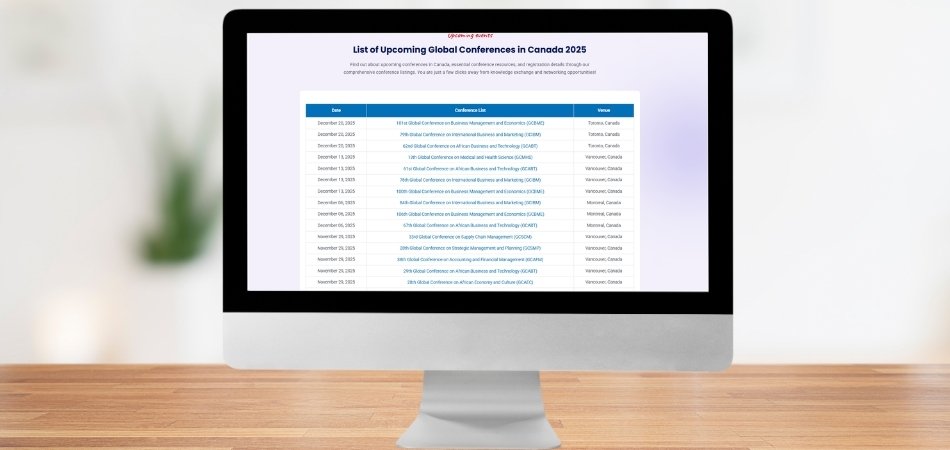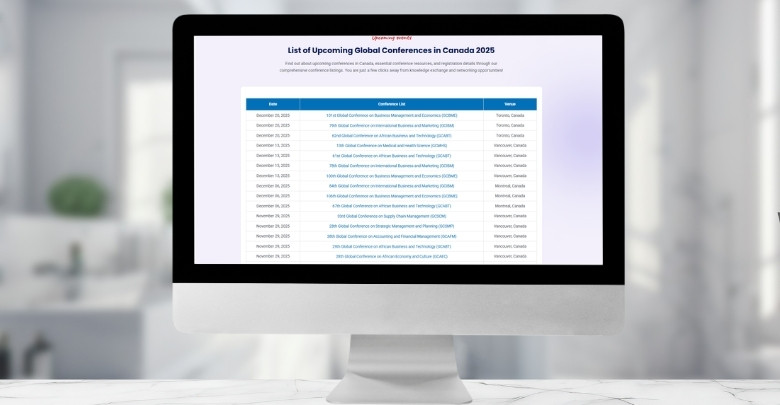Academic conferences are essential platforms for researchers, professionals, and students to present their work, network with experts, and stay updated on industry trends. Whenever you are planning to attend a conference but don’t know how to find relevant academic conferences in Canada, there are several practical methods to help you discover the right events.
To find relevant academic conferences in Canada, explore online resources such as Global Conference Alliance Inc. and Evenbrite. For information about field-specific events, consult the websites of professional associations and university event calendars. Make use of LinkedIn and academic networks to stay up-to-date, and subscribe to relevant mailing lists to receive the latest information.
By using these methods, you can find conferences that align with your academic and career goals. Follow this article to explore each approach in detail and maximize your conference opportunities.
How to Find Relevant Academic Conferences in Canada? (Simple Steps to Follow)
Having access to academic conferences is crucial for researchers and professionals looking to share knowledge and expand their networks. An event’s success depends on research and strategic planning. Use these steps to discover conferences that align with your academic and career goals.
Step 1: Utilize Online Conference Directories
Websites like Global Conference Alliance Inc. provide updated listings of academic events. These platforms categorize conferences by topic, location, and date. Filtering by your field of interest ensures you find the most relevant options. Set up alerts to receive notifications about new conferences in Canada.
Step 2: Check Professional Association Websites
Many academic and industry associations host annual conferences for their members. Visit their websites to find upcoming events tailored to your research area. Membership in these organizations often grants early access to conference announcements. Engaging with these associations can also help you connect with like-minded professionals.
Step 3: Browse University Event Calendars
Canadian universities frequently organize academic conferences and symposiums. Checking the event calendars of top institutions helps you stay informed about research-focused gatherings. Many university-hosted events welcome external participants, providing valuable learning opportunities. Attending a well-recognized conference in Canada can enhance your academic and professional credibility.
Step 4: Utilize LinkedIn and Academic Networks
Social media platforms like LinkedIn can be useful for finding upcoming conferences. Many academic groups and professionals share event details within their networks. Engaging in discussions or joining research-related communities increases your chances of finding valuable events. Connecting with peers in your field can lead to recommendations for relevant conferences.
Step 5: Subscribe to Mailing Lists and Newsletters
Many organizations send conference announcements via email to their subscribers. Signing up for mailing lists of academic institutions, professional bodies, and event organizers keeps you informed. Newsletters often include exclusive details about deadlines, keynote speakers, and registration discounts. Staying subscribed ensures you never miss an important event.
Step 6: Explore Call for Papers and Journals
Academic journals and publishers often promote relevant conferences alongside calls for paper submissions. Reviewing recent publications in your field can help identify upcoming conferences seeking research contributions. This method is particularly useful for those looking to present their work. Submitting to a conference early increases the likelihood of securing a speaking opportunity.
Step 7: Network With Peers and Mentors
Colleagues, professors, and industry mentors can provide valuable recommendations on upcoming conferences. Engaging in discussions within your academic circle often leads to insights on the most impactful events. Personal referrals can also help you understand the application or registration process. Attending conferences recommended by trusted sources ensures you make the most of these opportunities.
Canadian Academic Conferences: Why They’re Important?
Taking part in academic conferences in Canada has many benefits for professionals and researchers. These events provide a platform to exchange ideas and learn from experts. They also help in building valuable networks that can shape future collaborations. Here’s why Canadian academic conferences matter for your academic growth:
Opportunities for Networking
Conferences connect you with scholars, researchers, and professionals from around the world. Meeting new people can lead to collaborative projects. Face-to-face interactions help build strong, lasting professional relationships. Networking can also create career opportunities and new perspectives in your field.
Knowledge Sharing
Presenting your research at a conference gives you valuable feedback from peers. This exchange of ideas can refine your work and open new avenues. Learning about cutting-edge research enhances your understanding of the field. You can apply this new knowledge to your own projects and career.
Professional Development
Participating in conferences boosts your credibility and professional profile. Gaining exposure to new topics improves your skill set. Attending workshops and seminars helps you stay updated on industry trends. Continuous learning in these settings keeps you competitive and relevant in your field.
Exposure to New Ideas
Academic conferences showcase emerging research and innovative approaches. Attendees gain insights into new methodologies and technologies. Exposure to different viewpoints broadens your understanding of complex issues. Engaging with new ideas can spark creativity and inspire new research directions.
Career Advancement
Presenting your work at Canadian academic conferences can open doors to new career paths. Researchers gain recognition, which can lead to more funding and support. These events often feature job opportunities and mentorship programs. A strong conference presence helps you stand out in competitive academic and professional environments.
What Are the Basic Requirements for Attending a Conference?
Taking part in a conference can provide you with a valuable opportunity to learn, network, and grow professionally. Having a clear idea of the requirements ensures a smooth and productive experience. Here’s what you need to prepare before attending an academic event:
Registration and Fees
Most conferences require early registration to secure a spot. Registration fees vary based on event type, location, and participation level. Some conferences offer student discounts or early-bird pricing. Checking deadlines helps avoid late fees and ensures timely entry.
Submission of Abstract or Paper
Presenting research often requires submitting an abstract or full paper for review. Guidelines specify formatting, word limits, and submission deadlines. Accepted submissions may be published in conference proceedings. Meeting requirements increases chances of approval and participation.
Travel and Accommodation Arrangements
Planning travel early helps secure affordable flights and hotel bookings. Some conferences partner with hotels to offer discounted rates. Checking visa requirements prevents unexpected delays for international attendees. Proper planning ensures stress-free travel and arrival.
Proof of Affiliation or Credentials
Many conferences ask for institutional affiliation or professional credentials. Providing a university ID or employer verification confirms eligibility. Some high-level events require proof of research work. These documents help meet the academic conference attendance criteria set by organizers.
Preparing Conference Materials
Bringing printed or digital copies of presentations ensures a smooth session. Carrying business cards helps in networking and future collaborations. Reviewing the schedule helps plan sessions in advance. Being prepared enhances participation and engagement.
Being Aware of Conference Etiquette
Professional behavior is expected during all sessions and networking events. Respecting time limits during presentations ensures smooth scheduling. Engaging with speakers and peers fosters meaningful discussions. Active participation maximizes learning and professional growth.
Top Apps That Make It Easy to Find Relevant Academic Conferences in Canada
There are several apps that simplify the process of finding relevant academic conferences in Canada. These tools make it easier for researchers, students, and professionals to stay up-to-date on the latest trends and network with other professionals. Listed below are the top apps for conference hunting:
- Academics: Created for scholars, this platform lists conferences, workshops, and seminars. It offers personalized recommendations based on user preferences and academic interests.
- Eventbrite: While not exclusive to academics, Eventbrite features numerous Canadian conferences. Its intuitive interface allows users to search and register for events seamlessly.
- Scholars Globe: This app specializes in academic and professional events worldwide. It includes detailed descriptions, deadlines, and links to conference websites.
- ResearchGate: Beyond networking, ResearchGate highlights upcoming conferences relevant to your research. Users can connect with organizers and peers directly through the platform.
- Meetup: Ideal for finding smaller, niche academic gatherings in Canada. The app also fosters community engagement and collaboration among attendees.
- PaperCrowd: Focused on academic events, PaperCrowd offers a curated list of conferences. It includes user reviews and ratings to help you choose the best options.
- ConfBay: This platform streamlines conference discovery with advanced search filters. It also provides tools for submitting papers and managing event schedules.
- Google Scholar: While primarily a research tool, it often highlights conferences related to your field. Users can track event updates and deadlines efficiently.
Conferences at Home or Abroad: Which is More Significant?
Academic and professional conferences offer valuable learning and networking opportunities. Choosing between local and international events depends on accessibility, exposure, and cost. Below is a comparison of the significance of attending conferences at home versus abroad.
| Aspect | Conferences at Home | Conferences Abroad |
| Cost | More affordable, with lower travel and accommodation expenses. | Higher costs due to flights, lodging, and visa requirements. |
| Accessibility | Easier to attend, requiring less time for travel. | Requires extensive planning, including travel and visa approvals. |
| Networking | Connects with local professionals and experts in your region. | Expands global connections and fosters international collaborations. |
| Exposure | Focuses on national trends and industry developments. | Offers insights into global advancements and diverse perspectives. |
| Opportunities | Easier to find job prospects within the local market. | Increases chances for global career and research opportunities. |
| Comfort Level | More familiar environment, reducing cultural and language barriers. | Exposure to new cultures and languages enhances adaptability. |
| Recognition | Helps build a strong reputation within the national industry. | Greater prestige and broader recognition for international exposure. |
| Learning Scope | Covers topics relevant to the local market and industry needs. | Includes diverse topics with a broader academic and professional reach. |
| Time Commitment | Requires less time for travel and adjusting to new surroundings. | Demands more time for preparation, travel, and acclimatization. |
| Funding Support | Easier to get local sponsorships and institutional funding. | International funding may be available but is more competitive. |
How to Choose an Academic Conference in Canada You Won’t Regret?
Your career growth and knowledge will be advanced when you attend an academic conference. By selecting the right academic conference, you can gain valuable insights and make valuable connections. Follow these instructions to find a conference that aligns with your goals and expectations:
Identify Your Research Interests
Selecting a conference that matches your field ensures relevance. Reviewing past topics helps determine if it aligns with your expertise. Checking speaker lists provides insight into the event’s academic credibility. Choosing wisely enhances your learning experience and networking potential.
Check the Conference’s Reputation
A well-established conference attracts experts and industry leaders. Researching past attendees and keynote speakers reveals the event’s credibility. Looking for published proceedings ensures recognized contributions to the academic community. A reputable conference boosts your professional visibility.
Evaluate the Location and Logistics
The conference location impacts travel time, costs, and accessibility. Considering transportation and accommodation options helps with smooth planning. Some conferences offer virtual attendance, reducing travel expenses. Choosing a convenient location makes participation stress-free and enjoyable.
Analyze Presentation and Networking Opportunities
Opportunities to present research enhance academic exposure and recognition. You can explore Canada conferences for presentations that align with your expertise and career goals. Participating in discussions and workshops strengthens professional relationships. Engaging with peers fosters collaborations and future opportunities.
Review Registration Costs and Funding
Conference fees vary depending on the event scale and reputation. Checking early-bird discounts helps reduce registration costs. Exploring institutional funding or grants eases financial burdens. Budgeting ahead ensures you maximize the conference experience.
Look at Conference Proceedings and Publications
Publishing opportunities enhance your academic profile and research impact. Selecting conferences that offer peer-reviewed publications adds credibility to your work. It is helpful to review past proceedings to determine content quality and relevance. Well-documented conferences improve knowledge sharing and career growth.
Frequently Asked Questions
Getting involved in academic conferences in Canada is crucial for networking, learning, and career growth. However, finding the right conference can be challenging without proper guidance. Below are frequently asked questions that provide clear insights into finding and selecting relevant academic conferences in Canada.
What Are the Benefits of Attending a Niche Academic Conference in Canada?
Niche conferences focus on specific research areas, providing deeper discussions and targeted networking. They attract experts, fostering valuable collaborations and academic growth. Attendees gain insights into emerging trends and receive relevant feedback. Such conferences often create a strong professional community in specialized fields.
How Can I Verify the Credibility of an Academic Conference in Canada?
Check if the conference is organized by reputable institutions, associations, or research groups. Reviewing past keynote speakers and published proceedings ensures its legitimacy. Indexed conferences in Scopus or IEEE are more credible. Avoid events with unclear review processes or lack of transparency.
How Far in Advance Should I Start Looking for Academic Conferences?
Start searching at least six months before the event date. This allows time for abstract submissions, funding applications, and travel arrangements. Early registration also provides discounts and priority access. Planning ahead ensures a smooth and stress-free conference experience.
Can Attending Conferences in Canada Help in Career Advancement?
Yes, academic conferences provide exposure to industry leaders and researchers. They offer job opportunities, research collaborations, and funding possibilities. Presenting work enhances credibility and professional reputation. Conference participation strengthens resumes and career prospects.
What Are Some Mistakes to Avoid When Choosing a Conference?
Avoid predatory or low-quality conferences with unclear review processes. Ensure the event aligns with your research interests. Ignoring registration deadlines can lead to missed opportunities. Choosing wisely maximizes professional benefits and networking potential.
Can I Attend Multiple Conferences in a Year?
Yes, but consider relevance, budget, and time commitments. Prioritizing quality over quantity ensures meaningful academic engagement. Attending diverse conferences broadens knowledge and networking opportunities. A balanced approach maximizes career and research growth.
Bottom Line
Research and professional development are crucially impacted by the choice of the right academic conference. Exploring multiple resources, such as online directories, university event calendars, and professional associations, helps identify suitable opportunities. If you’re still wondering how to find relevant academic conferences in Canada?, using LinkedIn networks, subscribing to mailing lists, and reviewing call-for-paper announcements can guide you toward the best events.
By participating in well-established conferences, you will be able to network effectively, exchange knowledge, and advance your career. Evaluating factors like registration costs, location, and presentation opportunities maximizes the experience. Engaging with peers and mentors further enhances conference success. Whether attending locally or internationally, being well-prepared ensures a rewarding experience. Prioritizing research interests and funding options helps you make informed decisions and avoid regrets.








